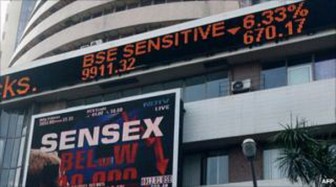 By Herbert Lash
By Herbert Lash
NEW YORK (Reuters) – Global shares and crude oil pared early gains to trade mostly lower on Monday after U.S. manufacturing activity hit a three-year low in November, offsetting signs of revived growth in China.
In a sign that U.S. manufacturing may be struggling to gain traction, the Institute for Supply Management said its index of national factory activity was the softest since July 2009, when the U.S. economy was struggling in the aftermath of the financial crisis. The November reading may have been affected by superstorm Sandy, which hit the U.S. East Coast in late October.
Wall Street declined, as did European markets at their close and Brent oil prices, despite upbeat factory data from China and a slower contraction in European manufacturing.
Political haggling in Washington over the “fiscal cliff” remained the primary focus of investors. Unless Congress acts, some $600 billion of sharp spending cuts and tax hikes will take effect starting in January, which could tip the U.S. economy into recession.
“Markets have lately been more optimistic than what the reality of the negotiations seems to be, and the reality of that may be starting to set in,” said David Carter, chief investment officer at Lenox Wealth Advisors in New York.
“Until the cliff gets resolved, market upside may be capped while the downside isn’t constrained,” Carter said.
The Dow Jones industrial average closed down 59.98 points, or 0.46 percent, at 12,965.60. The Standard & Poor’s 500 Index fell 6.72 points, or 0.47 percent, at 1,409.46. The Nasdaq Composite Index slid 8.04 points, or 0.27 percent, at 3,002.20.
European shares gave up most of their gains in a late sell-off, retreating from a 17-month high following release of the U.S. manufacturing data and on persistent concerns about the U.S. fiscal dispute.
The FTSEurofirst 300 index of top European shares edged up 0.16 percent to close at 1,121.15, after earlier rising to 1,128.65.
World shares as measured by MSCI’s all-country equity index fell 0.11 percent to 332.26.
The euro leaped to its highest level against the U.S. dollar in six weeks as concerns abated about debt-burdened Greece and Spain, while Chinese data allayed worries about global growth.
The euro was up 0.50 percent at $1.3049, while the U.S. dollar index fell 0.30 percent to 79.914.
Copper touched a six-week high on the promising data from China, the world’s top metals consumer. But doubts about the soundness of the global economy put a lid on gains.
Benchmark copper on the London Metal Exchange hit $8,045 a tonne, the highest since October 19, before closing at $8,005, up from Friday’s close at $7,994.
U.S. Treasuries prices fell on news that Spain is seeking help for its troubled banks, while the Chinese manufacturing data also reduced safe-haven demand for less risky government debt.
“You got the Spain news, which was expected, but it was still welcomed news for risky assets. You also had some pretty good Chinese data. The (bond) market is a little fatigued,” said Jason Rogan, director of Treasuries trading at Guggenheim Partners in New York.
The benchmark 10-year U.S. Treasury note was down 3/32 in price to yield 1.6233 percent.
Oil rose above $112 per barrel, spurred by signs that growth is picking up in China, before trimming gains, with North Sea Brent turning negative.
Brent futures settled down 31 cents at $110.92 a barrel.
But U.S. crude rose 18 cents to settle at $89.09 a barrel.
(Additional reporting by Richard Hubbard; Reporting by Herbert Lash; Editing by Dan Grebler and Jan Paschal)
Source: Reuters






![[Thailand] Natural Rubber prices on Oct. 22, 2012](https://img.globalrubbermarkets.com/2024/08/thailand-natural-rubber-prices-on-oct-22-2012.jpg?resize=75%2C75&ssl=1)




















